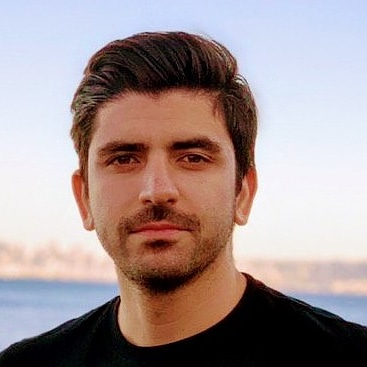 I received my Ph.D. in Computer Engineering from the Department of Computer and Electrical Engineering and Computer Science, Florida Atlantic University. My main research interests are Post-Quantum Cryptography and Homomorphic Encryption. In particular, I am working on highly-optimized implementation of cryptography protocols on various platforms.
I received my Ph.D. in Computer Engineering from the Department of Computer and Electrical Engineering and Computer Science, Florida Atlantic University. My main research interests are Post-Quantum Cryptography and Homomorphic Encryption. In particular, I am working on highly-optimized implementation of cryptography protocols on various platforms.
During my doctoral research, I was conducting research with a focus on the Post-Quantum Isogeny-based Cryptography at the Institute for Sensing and Embedded Network Systems Engineering (ISENSE).
During summer 2017-2018, I was working as a Research Intern with Cryptography Research Group at Microsoft Research, under the supervison of Kristin Lauter and Kim Laine.
In summer 2018-2019, I did an internship as a Security Software Engineer with Security Group at LinkedIn Corporation under supervision of Neil Davenport and Tushar Dalvi.
I am also a member of the Supersingular Isogeny Key Encapsulation (SIKE) team. SIKE mechanism is one of the promising quantum resistant candidates for the quantum era. The proposal is publicly available at NIST’s Post-Quantum Standardization Submissions.
Currently, I am a Software Engineer with the Information Security Group at LinkedIn, working on a variety of security software implementations.
Employment
- Software Engineer - LinkedIn Corporation, Sunnyvale, CA. (February 2019 - present)
- Security Software Engineer Intern - LinkedIn Corporation, Sunnyvale, CA. (Summer 2018)
- Research Intern, Microsoft Research, Redmond, WA. (Summer 2017)
Selected Publications
Journals
[J6] A. Jalali, R. Azarderakhsh, M. Mozaffari Kermani, M. Campagna, and D. Jao,“ARMv8 SIKE: Optimized Supersingular Isogeny Key Encapsulation on ARMv8 Processors”, IEEE Trans. on Circuits and Systems, 2019.
[J5] H. Chen, R. Gilad-Bachrach, K. Han, Z. Huang, A. Jalali, K. Laine, K. Lauter,“Logistic regression over encrypted data from fully homomorphic encryption”, BioMed Central Journal, 2018.
[J4] R. Azarderakhsh, M. Campagna, C. Costello, L. De Feo, B. Hess, A. Jalali, D. Jao, B. Koziel, B. LaMacchia, P. Longa, M. Naehrig, J.
Renes, V. Soukharev, and D. Urbanik, “SupersingularIsogeny Key Encapsulation (SIKE)”. Submission to the NIST Post-Quantum Standardization project, 2017.
[J3] M. Mozaffari Kermani, R. Azarderakhsh, A. Sarker, and A. Jalali,“Efficient and reliable error detection architectures of Hash-Counter-Hash tweakable enciphering schemes”,* ACM Trans. Embedded Comput. Syst.*, 2018.
[J2] M. Mozaffari Kermani, A. Jalali, R. Azarderakhsh, J. Xie, and R. Choo, “Reliable Inversion in GF($2^{8}$) with Redundant Arithmetic for Secure Error Detection of Cryptographic Architectures”, IEEE Trans. Comput.-Aided Design Integr. Circuits Syst., 2018.
[J1] A. Jalali, R. Azarderakhsh, M. Mozaffari Kermani, and D. Jao. “Supersingular Isogeny Diffie-Hellman Key Exchange on 64-bit ARM”. IEEE Trans. on Dependable and Secure Computing, 2017
Conferences
[C10] Seo. H, A. Jalali, R. Azarderakhsh, “SIKE Round 2 Speed Record on ARM Cortex-M4”,Cryptology and Network Security. CANS 2019. Lecture Notes in Computer Science, vol 11829. Springer, 2019. Best Paper Award
[C9] A. Jalali, R. Azarderakhsh, M. Mozaffari Kermani, and D. Jao, “Towards Optimized and Constant-Time CSIDH on Embedded Devices”, In Proc. Constructive Side-Channel Analysis and Secure Design (COSADE), 2019.
[C8] A. Jalali, R. Azarderakhsh, and M. Mozaffari Kermani, “NEON SIKE: Supersingular isogeny key encapsulation on ARMv7”, in Proc. Int. Conf. Security, Privacy, and Applied Cryptography Engineering (SPACE), pp. 37-51, 2018.
[C7] M. Mozaffari Kermani, A. Jalali, and R. Azarderakhsh, “Lightweight error detection architectures through swapping the shares for a subset of S-Boxes”, in Proc. IEEE Int. Midwest Symp. on Circuits and Systems, 2018.
[C6] H. Chen, K. Han, Z. Huang, A. Jalali, K. Laine, “Simple Encrypted Arithmetic Library v2.3.0”, Microsoft Research, 2017.
[C5] M. Brenner, W. Dai, S. Halevi, K. Han, A. Jalali, M. Kim , K. Laine, A. Malozemoff, P. Paillier, Y. Polyakov, K. Rohloff, E. Sava, and B. Sunar, “A Standard API for RLWE-based Homomorphic Encryption”, Homomorphic Encryption Standardization Workshop, Microsoft Research, 2017.
[C4] A. Jalali, R. Azarderakhsh, and M. Mozaffari-Kermani, “Efficient Post-Quantum Undeniable Signature on 64-bit ARM”, Conf. Selected Areas in Cryptography (SAC), 2017.
[C3] Yoo, Y., Azarderakhsh, R., Jalali, A., Jao, D., and Soukharev, V., “A Post-Quantum Digital Signature Scheme based on Supersingular Isogenies”, in Proc. Conf. Financial Cryptography and Data Security, 2017.
[C2] B. Koziel, A. Jalali, R. Azarderakhsh, D. Jao, and M. Mozaffari-Kermani, “NEON-SIDH: Efficient Implementation of Supersingular Isogeny Diffie-Hellman key exchange protocol on ARM”, In International Conference on Cryptology and Network Security, pp. 88-103. Springer, 2016.
[C1] A. Jalali, and H. Pedram, “Timing Yield and Reliability Improvement of Carbon Nano-tube FET Based Digital Circuits with Statistical Driven Correlation-aware Placement”, Electronics and Nanotechnology (ELNANO), IEEE XXXIII International Scientific Conference, 2013.
Development
- Highly-optimized ARMv8 implementation of Supersingular Isogeny Key Encapsulation (SIKE)
- Supersingular Isogeny Key Encapsulation (SIKE) over p964
- An Efficient Implementation of Supersingular Isogeny 3-party Group Key Agreement
- Constant-Time CSIDH on ARMv8
Awards
-
Best Paper Award in Cryptology and Network Security, CANS 2019, Fuzhou, China (October 2019)
-
Dr. Christopher Seiffert Memorial Award for outstanding Ph.D. Graduate, Florida Atlantic University (December 2018)
-
Second place in iDash Privacy and Security Workshop Competition, Homomorphic Encryption Track, Microsoft Research Team. (October 2017)
-
Best Poster Award in FICS Annual Conference on Cybersecurity, University of Florida. (March 2017)
Teaching
- Cryptographic Engineering Lab Instructor - Florida Atlantic University. (2016-2018)
- Design of Digital Systems Lab Instructor - Florida Atlantic University. (2016-2018)
Contact
E-mail: ajalali[at]linkedin.com